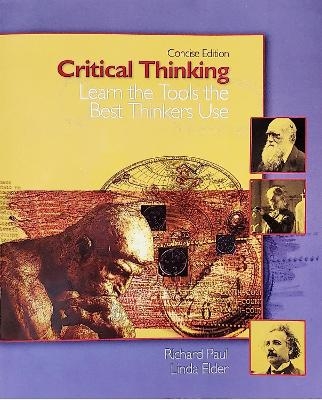
Critical Thinking
Rowman & Littlefield Publishers (Verlag)
978-1-5381-3950-9 (ISBN)
This introduction to critical thinking focuses on an integrated, universal concept of critical thinking that is both substantive and practical. It provides students with the basic intellectual skills they need to think through content in any class, subject, or discipline, and through any problems or issues they face.
Now available from Rowman & Littlefield, Richard Paul and Linda Elder's Critical Thinking: Learn the Tools the Best Thinkers Use focuses on the most basic critical thinking concepts. It includes activities that allow readers to apply these concepts within disciplines and to life. An added feature to this brief book is a focus on close reading and substantive writing.
Content highlights include:
Think for Yourself activities
Discovering the parts of thinking and the standards for thinking
Learning to formulate clear and substantive questions
Making the design of a course work for you
Close reading and substantive writing
Becoming a fairminded thinker
Dr. Linda Elder is an educational psychologist who has taught both psychology and critical thinking at the college level. She has been President of the Foundation for Critical Thinking and the Executive Director of the Center for Critical Thinking for almost 25 years. She has a special interest in the relation of thought and emotion, as well as the cognitive and affective. She has developed an original theory of the stages of critical thinking development. Elder has coauthored four books on critical thinking, as well as all 23 titles found in the Thinker's Guide Library. Dr. Richard Paul was a leading proponent of critical thinking and through his work and legacy remains an international authority in the field. He founded the Center for Critical Thinking at Sonoma State University in 1980, followed by the Foundation for Critical Thinking. He developed concepts, principles, and theory essentials to a robust and fairminded conception of critical thinking and authored more than 200 articles and seven books on the topic. He presented workshops to hundreds of thousands of educators over his 35-year career as a leader in the critical thinking movement.
Introduction: A Start-up Definition of Critical Thinking.
1. How the Mind Can Discover Itself
2. Discover The Parts of Thinking
3. Discover Universal Standards for Thinking
4. Redefining Grades as Levels of Thinking and Learning
5. Learn to Ask the Questions the Best Thinkers Ask
6. Discover How the Best Thinkers Learn
7. Learn How to Read Closely and Write Substantively
Part I: Discover Close Reading
Part II: Discover Substantive Writing
Part III: Practice Close Reading and Substantive Writing
8. Become a Fairminded Thinker
9. Deal with Your Irrational Mind
Part I: The Best Thinkers Take Charge of Their Egocentric Nature
Part II: The Best Thinkers Take Charge of Their Sociocentric Thinking
10. The Stages of Critical Thinking Development: At What Stage Are You?
Appendix A: Further Exercises in Close Reading and Substantive Writing
Appendix B: Sample Analyses of “The Logic of . . .”
Appendix C: What We Mean By “The Best Thinkers?”
Glossary
| Erscheinungsdatum | 24.06.2021 |
|---|---|
| Verlagsort | Lanham, MD |
| Sprache | englisch |
| Maße | 196 x 234 mm |
| Gewicht | 576 g |
| Themenwelt | Geisteswissenschaften ► Philosophie ► Logik |
| Sozialwissenschaften ► Pädagogik | |
| Wirtschaft ► Betriebswirtschaft / Management ► Allgemeines / Lexika | |
| ISBN-10 | 1-5381-3950-2 / 1538139502 |
| ISBN-13 | 978-1-5381-3950-9 / 9781538139509 |
| Zustand | Neuware |
| Haben Sie eine Frage zum Produkt? |
aus dem Bereich


